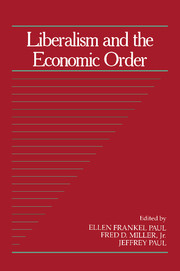Book contents
- Frontmatter
- Contents
- Introduction
- Acknowledgments
- Contributors
- The Social Market Economy
- From Post-Communism to Civil Society: The Reemergence of History and the Decline of the Western Model
- Asymmetrical Reciprocity in Market Exchange: Implications for Economies in Transition
- Institutions, Nationalism, and the Transition Process in Eastern Europe
- The Economic and Political Liberalization of Socialism: The Fundamental Problem of Property Rights
- Democracy, Markets, and the Legal Order: Notes on the Nature of Politics in a Radically Liberal Society
- Liberalism: Political and Economic
- Socialism as the Extension of Democracy
- Liberalism, Welfare Economics, and Freedom
- Some Rules of Constitutional Design
- The Morality of Inclusion
- A New Contractarian View of Tax and Regulatory Policy in the Emerging Market Economies
- Associations and Democracy
- Index
The Economic and Political Liberalization of Socialism: The Fundamental Problem of Property Rights
Published online by Cambridge University Press: 05 October 2010
- Frontmatter
- Contents
- Introduction
- Acknowledgments
- Contributors
- The Social Market Economy
- From Post-Communism to Civil Society: The Reemergence of History and the Decline of the Western Model
- Asymmetrical Reciprocity in Market Exchange: Implications for Economies in Transition
- Institutions, Nationalism, and the Transition Process in Eastern Europe
- The Economic and Political Liberalization of Socialism: The Fundamental Problem of Property Rights
- Democracy, Markets, and the Legal Order: Notes on the Nature of Politics in a Radically Liberal Society
- Liberalism: Political and Economic
- Socialism as the Extension of Democracy
- Liberalism, Welfare Economics, and Freedom
- Some Rules of Constitutional Design
- The Morality of Inclusion
- A New Contractarian View of Tax and Regulatory Policy in the Emerging Market Economies
- Associations and Democracy
- Index
Summary
All our previous political experience, and especially, of course, the experience of Eastern Europe and Central Asia, offers little hope that democracy can coexist with the centralized allocation of economic resources. Indeed, simple observation suggests that a market economy with private property rights is a necessary, although not sufficient, condition for the existence of a democratic political regime. And this accords fully with the political theory of liberalism, which emphasizes that private rights, both civil and economic, be protected and secure. At the same time, our previous experience also indicates that market economies are more successful than centrally planned economies not only in producing, but also in distributing, both private and collective goods. This economic experi- ence is supported by neoclassical economic theory, which treats clearly defined and secure rights to private property as essential to a market economy.
Until recently, the former Soviet Union and the other political systems of Eastern Europe rejected private ownership of capital and, in some cases, of land and labor as well. Now, however, their desire for economic development and political liberalization forces the leaders of these countries to confront the issue of private property. Absent considerable movement toward the private ownership of the factors of production, the potential benefits of a decentralized market economy are unlikely to be realized; absent a well-functioning decentralized economy, democratization lacks a secure foundation and remains highly vulnerable to authoritarian resurgence. Thus, the extent and form of institutional, indeed constitutional, change from state to private ownership will be one of the fundamental determinants of the rate, degree, and stability of the political liberalization achieved by these socialist and formerly socialist countries.
- Type
- Chapter
- Information
- Liberalism and the Economic Order , pp. 79 - 102Publisher: Cambridge University PressPrint publication year: 1993
- 1
- Cited by



